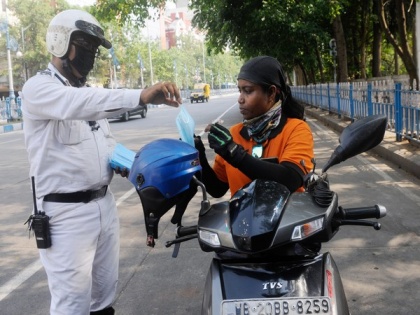Local self-govts continue to help mitigate Covid-19 spread in Kerala
By ANI | Published: May 19, 2021 11:36 PM2021-05-19T23:36:43+5:302021-05-19T23:45:02+5:30
Amid the Covid-19 pandemic, local self-governments in Kerala have played a vital role in containing the spread of the infectious virus since it broke out last year.

Local self-govts continue to help mitigate Covid-19 spread in Kerala
Amid the Covid-19 pandemic, local self-governments in Kerala have played a vital role in containing the spread of the infectious virus since it broke out last year.
Local bodies were actively involved in managing the virus from the first wave itself, with staff and volunteers offering services without any kind of remuneration.
In Thiruvananthapuram corporation, each ward called upon 25 volunteers and a Rapid Response team, including the Sectoral Magistrate, health inspector, CI, ward councillor, Asha workers, junior public health nurses, secretary and presidents of residence association and volunteers.
In the first wave last year, volunteers mainly worked in community kitchens. But with the rising number of cases this year across all wards, volunteers have managed to arrange ambulance services, medical kits, food distribution and purchasing groceries and other items that patients in isolation may need.
Community kitchens working under corporations and volunteers are collect food items for the distribution of food packets.
Asha workers, especially, have especially been active on the ground, visiting multiple houses daily.
While speaking to ANI, an Asha worker in the Vazhuthacaud ward, Remya, said that she gives special care to the elderly who lives alone and calls them daily.
"I visit several houses daily and tell people how to take care of themselves. I also give special care to elderly people staying alone and call them every day. If they need something, I arrange it through volunteers and the ward councillor," the Asha worker said.
She added, "Local self bodies are working successfully in Covid containment with the help of people participation. Apart from volunteers, many youth organizations of political parties are also involving with Covid containment activities of local self-governments."
Rakhi Ravikumar, councillor of Vazhuthacaud ward has credited the efficient handling of the pandemic to speedy measures by the state and local governments as well as local volunteers.
"The state and local government's speedy measures have played a major role in combatting the spread. The first time, when people were unfamiliar with hand sanitisers and masks, we introduced break-through chain campaigns and we have provided the necessary equipment. We also introduced community kitchens," she said.
Ravikumar added that at the time, they had about 25 community kitchens and all volunteers were involved in packing and delivering foods. This time around, they want to focus on the care for infected patients.
"During the first wave, there were very few patients so we focussed on food and ration. Cases have increased this time. 68 patients are down with Covid-19 in my ward. Volunteers are providing food and medicines, and if someone dies, volunteers go with a health inspector for cremation," she said.
While funding for services mainly comes from the local government, residential associations and volunteers also make donations.
"We don't pay them (volunteers) anything. It is all a matter of service. Now we are getting some donations for our Rapid Response Team and are now able to manage petrol expenses," the ward councillor said.
The most requested item is food, said Rahul, a volunteer in the ward, especially from older people who live alone. His team also distributes food to people on the streets.
"Whenever anyone tests positive, they inform the councillor and we arrange a medical kit and take them to the hospital in an ambulance. If they need medicines, we all arrange for it with the help of Asha workers. People in quarantine mostly ask for food. We always keep extra food packets to give to people sitting on the roadsides," Rahul said.
( With inputs from ANI )
Disclaimer: This post has been auto-published from an agency feed without any modifications to the text and has not been reviewed by an editor
Open in app